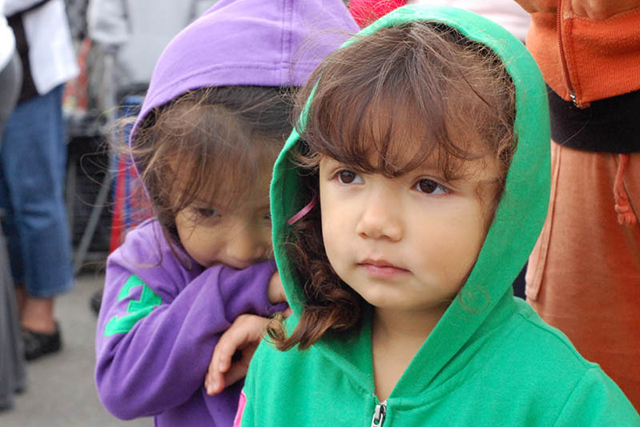
Photo Courtesy of M., Flickr Creative Commons
One of the most coveted days of the fall season is rapidly approaching: Thanksgiving. While this holiday does not mean fun costumes or presents, it is the one day of the year where calories do not matter and one is never full. The family table is nearly spilling over with turkey roasted to perfection, creamy mashed potatoes, sweet cranberry sauce and stuffing with mysterious yet delicious ingredients. Thanksgiving is a holiday meant to reunite families, reminding them all of the good fortunes of their life as they chow down on the feast. While many rejoice for the blessings in their life, some are not as lucky as to enjoy a succulent meal.
According to No Kid Hungry, “48.8 million Americans – including 16.2 million children – live in households that lack the means to get enough nutritious food on a regular basis.”
This statistic indicates that almost one out of every four children is living in a home that does not provide sufficient food for a healthy lifestyle. Many children throughout the nation must rely on free school lunches as their one regular source of subsistence. While these organizations that aid in the fight against childhood hunger provide balanced meals for lunches, it is still not enough to reach a child’s necessary nutritional requirements for the day.
The issue is not just that children are going to bed hungry nearly every night. The key to a child’s development, both physically and mentally, is having a stable source of nutrition. One of the leading organizations in America whose goal it is to fight food insecurity is “Feeding America.”
In an article discussing the negative effects of childhood hunger, the organization states that “children growing up in food-insecure families are vulnerable to poor health and stunted development from the earliest stages of life.”
Lacking proper subsistence hinders a child’s physical health, causing them to be more prone to diseases or health conditions such as anemia and asthma. On the opposite end of the spectrum, children that do not have a steady source of food tend to suffer from behavioral issues. They are more likely to fight and have heightened levels of aggression or experiencing anxiety.
While the information pertaining to the negative consequences of hunger are available, it seems that no one knows about these resources. While American children’s needs are kept quiet, it is nearly impossible to watch television without running into the UNICEF video about the crisis of hunger in Africa: after a barrage of pictures of desperate, hunger stricken children coming onto screen, Alyssa Milano pleads to the viewers to donate money in order to help those overseas.
It cannot be denied that the children of Africa do need assistance. However, unlike the barrage of commercials dedicated towards those overseas, there is noticeable silence when it comes to the needs of American children. Channels such as Food Network do have a few commercials on their station during the fall season that implore viewers to pay more attention to the needs of American children. Those advertisements, while filled with important information, are scarce and rarely aired other than the selected times. The lack of commercials and advertisements raise an important question. Why is it that there is a constant, repetitive reminder to assist those in other countries, yet rarely anyone advocates for America’s children?
When it comes to the lack of attention brought to the situation, there are a few possibilities as to why the children’s needs are not in the limelight. One possibility is the stigma surrounding food stamps. Many believe that due to low income homes being granted food stamps, there is no need for extra organizations or efforts.
There is also a stigma that those who need food stamps are purposely choosing not to work, instead being lazy and living off of government aid. A final possibility is that there is a certain level of ignorance when it comes to the needs of American children. Citizens who wish to keep an idealistic perception of the USA tend to turn a blind eye to those whose suffering is clashing with their ardent viewpoints.
For many patriots, accepting that their beloved country has suffering that is contradicting to their nationalistic standpoints can be difficult. This nation can still reach the point of excellence that many desire by shifting the focus to the needs of the future of this country: our children.
sdelelli@ramapo.edu





